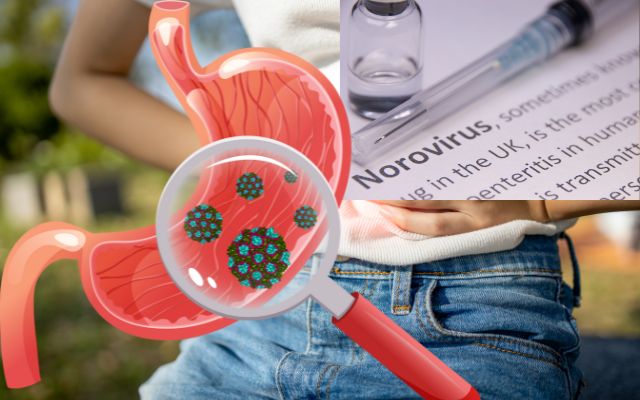What is Norovirus Infection in Children: A Report

What is Norovirus Infection? Norovirus infection can lead to severe vomiting and diarrhea that arises from nowhere. The norovirus is extremely contagious. They are typically transferred by contaminated food or water, as well as polluted surfaces. Noroviruses can also be transferred by close contact with a infected individual.
Symptoms such as diarrhea, stomach pain, and vomiting usually appear 12 to 48 hours after exposure. Norovirus Symptoms infection usually last one to three days. The majority of people recover entirely without the need for treatment. However, vomiting and diarrhea can dehydrate certain people, particularly young children, the elderly, and those with other medical issues, necessitating medical attention.
What Is Norovirus Infection ?
Its infections are particularly common in confined and crowded spaces. Hospitals, nursing homes, child care centers, schools, and cruise ships are all examples.
As per the UK Health Security Agency (UKHSA), cases of the highly contagious this virus have been on the rise in England, particularly in nurseries and care facilities.
The UKHSA has issued a warning that “unusual or out of season rises” may occur in the coming months, advising anyone with symptoms to stay at home as well as avoid visiting elderly relatives.
It is a highly infectious and contagious winter vomiting bug that spreads through contact with infected people and contaminated surfaces.
“Stay at home if you have norovirus symptoms and do not come back to work or send children to school/nurseries until 48 hours after signs have resolved,” advised Prof Saheer Gharbia, directorate of gastrointestinal infections as well as food security at the UKHSA.
“If you’re sick, avoid visiting older relatives, especially if they’re in a nursing home or hospital.”
Read Also-Obstructive Sleep Apnea
Norovirus Symptoms
The Following Are Signs And Symptoms Of Norovirus Infection That May Appear Suddenly
The elderly, extremely young children, and anyone with a weaker immune system are at a higher risk of becoming very sick from viruses like norovirus.
As per the Children’s Health site, norovirus symptoms are generally similar in all age groups, albeit kids are more likely to have vomiting as the major symptom, whereas adults may have more diarrhea.
Children’s Signs Of Dehydration
Dry mouth with sticky or no saliva, sobbing without tetrsars, dry-looking eyes, or no urinating for more than six to eight hours in small children, or 10 to 12 hours in older kids, are all possible symptoms.
Within one to 2 days of being contaminated, the symptoms usually arise suddenly.
If you get diarrhea that doesn’t go away after several days, contact a doctor. If you have severe vomiting, bloody stools, stomach pain, or dehydration, consult your doctor immediately.
Causes
This virus is extremely infectious. As a result, the norovirus can spread easily to others. The virus is spread by faeces and vomit. From the time you first notice symptoms of disease until many days after you have recovered, you can transfer the virus. Noroviruses can survive for days or weeks on surfaces and objects.
Infection Can Be Contracted By:
This virus (stomach bug) is hard to cure because they can tolerate extreme heat and cold, as well as a variety of disinfectants.
Risk Factors
The Following Are Risk Factors For This Infection:
Complications
The following are indications of dehydration:
This infection normally goes away in a few days for most people and isn’t life-threatening. This infection can be dangerous in some people, particularly young children, the elderly, persons with compromised immune systems or other medical issues, and pregnant women. Infection with the norovirus can result in severe dehydration and even death.
Children that are dehydrated may cry infrequently or not at all. They could be drowsy or fussy in strange ways.
Prevention Or Treatment
This virus is extremely contagious. This viruses come in a variety of forms. Anyone can become infected with the norovirus more than once.
To Avoid Becoming Infected With The This Virus, Take The Following Precautions:
For At Least 20 Seconds, Wash Your Hands With Soap And Water
Especially after using the restroom or changing a diaper, and before preparing food or drinking anything. Hand sanitizers containing alcohol aren’t as efficient against noroviruses as soap and water.
Contaminated Food And Drink Should Be Avoided
This includes consuming food that has been handled by a virus-infected person.
Clean Fruits And Veggies
Before consuming fruits and veggies, make sure they’re clean
Seafood Should Be Completely Cooked
Surfaces that have been polluted should be disinfected.
Wear Gloves And Disinfect
Wear gloves and disinfect with a chlorine bleach solution or a norovirus-resistant disinfectant.
Use Caution While Travelling
Consider eating only prepared foods, consuming only hot or carbonated beverages, and avoiding food sold by street sellers if you’re travelling to locations where norovirus is a significant danger.
During Your Sickness And For 2 To 3 Days After Your Symptoms Have Passed, Do The Following To Help Prevent The Spread Of Norovirus:
As much as possible, avoid making contact with others.
Hands should be thoroughly washed with soap and water.
Stay at home if you can. Children should be kept at home or in child care.
Handle food and goods that will be used by others with care. Disinfect infected surfaces with a norovirus-resistant disinfectant.
Carefully dispose of vomit and excrement. Soak up stuff using disposable cloths while wearing disposable gloves. To avoid spreading noroviruses through the air, disturb filthy material as little as possible. Place filthy objects in plastic bags and throw them away. Remove any potentially contaminated clothing and linens and wash them.
Wait 2 to 3 days after your symptoms have subsided before flying.
Conclusion
Norovirus is a very infectious and contagious winter vomiting bug that spreads through contact with infected people and contaminated surfaces.
“Stay at home if you have symptoms and therefore do not come back to work or send kids to school or nursery till 48 hours after signs have resolved,” advised Prof Saheer Gharbia, directorate of gastrointestinal infections and food safety at the UKHSA.
What Are The First Signs Of Norovirus?
Stomach flu, Vomiting and diarrhoea are all common symptoms.
How Does Norovirus Spread?
It is spread by inadvertently ingesting microscopic particles of faeces (poop) or vomit from an infected individual.
What Is The Most Effective Norovirus Treatment?
If you have a this infection, drink plenty of fluids to replace the fluid lost during vomiting and diarrhea.
How Long Does It Take For Someone To Become Contagious?
This infected people are contagious for at least three days after they recover from their illness.
How Do You Know If You Have Norovirus?
The majority of diagnoses are based on your symptoms, however it can be detected in a stool sample.
Disclaimer
The opinions presented in this article should not be regarded as a replacement for medical advice. For more information, please contact your treating physician.



